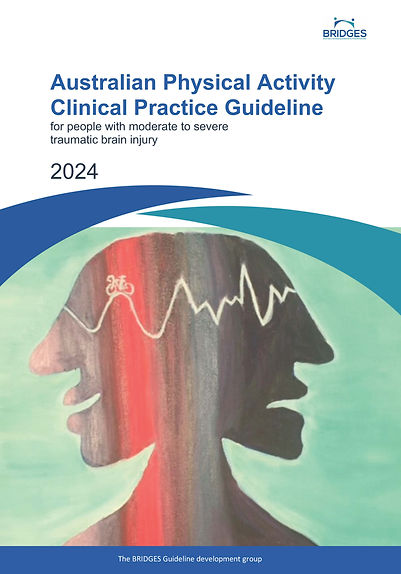Australian physical activity clinical practice guideline for people with moderate to severe traumatic brain injury
Welcome to the Australian Physical Activity Clinical Practice Guideline for people living with moderate to severe TBI (msTBI).
This guideline provides recommendations for physical activity interventions for children and adolescents (5 to 17), adults (18 years or older) and older adults (65 years or older) with msTBI. This guideline is targeted at health professionals working with people with msTBI (and other carers and providers) throughout the rehabilitation journey. It is intended to help health professionals support people with msTBI to improve participation in physical activity, leading to improved health and social outcomes.

This guideline was co-developed by a team of researchers in collaboration with people with msTBI and family members, health professionals, support workers, staff from government funding bodies of physical activity interventions, and community-based deliverers of physical activity programs. We acknowledge the key role of our partner organisation, icare NSW, and acknowledge the important contribution of consumer organisations; Brain Injury Australia, Connectivity TBI, and Heads Together for ABI. The guideline has been approved by the National Health and Medical Research Council, Australian Physiotherapy Association, Exercise & Sports Science Australia, and Rehabilitation Medicine Society of Australian and New Zealand.
This guideline was developed as part of a project called BRIDGES (BRain Injury: Developing GuidElineS for physical activities). BRIDGES was funded by the MRFF TBI Mission (2021).
Future Work
This year, the BRIDGES team received further funding from MRFF TBI Mission to implement the Australian Physical Activity Clinical Practice Guideline for people with msTBI in health services across Australia. We will support health services to use the guideline by tackling likely barriers to implementation, including barriers which may be specific to priority populations such as Indigenous Australians, those living in regional and remote settings, and Culturally and Linguistically Diverse (CALD) populations.
If you are interested in getting involved in our work, please email us at bridges.study@sydney.edu.au.
Funding
MRFF 2020 Traumatic Brain Injury Mission, Stream 2-incubator 2021-2023 (APP2009099)
Leanne Hassett, Gavin Williams, Catherine Sherrington, Sean Tweedy, Luke Wolfenden, Maria Crotty, Kirsten Howard, Abigail Haynes (CIs), Adrian Bauman, Grahame Simpson, Adam Scheinberg, Kelly Clanchy, Anne Tiedemann, Gabby Vassallo, Nick Rushworth (AIs). icare NSW (Rhys Ashpole) (Partner organisation).
MRFF 2023 Traumatic Brain Injury Mission, Stream 2 (APP2035383)
Leanne Hassett, Gavin Williams, Luke Wolfenden, Catherine Sherrington, Adam Scheinberg, Abigail Haynes, Sean Tweedy, Liam Johnson, Jennifer Smith-Merry, John Gilroy, Gabby Vasallo, Ian Cameron, Kris Rogers, Rakhee Raghunandan, Bernadette Brady (CIs); Adrian Bauman, Grahame Simpson, Kelly Clanchy, Anne Tiedemann, Nick Rushworth, Kirsten Howard, Simon Mills, Kerry West, Sarah Veli-Gold, Peter Mayhew, Francesca Brady, Kate Heine (AIs); icare NSW (Rhys Ashpole), Connectivity Traumatic Brain Injury Australia (Naomi Fuller), The Australian Sporting Alliance for People with a Disability (Phil Hamdorf) (Partner organisations).

